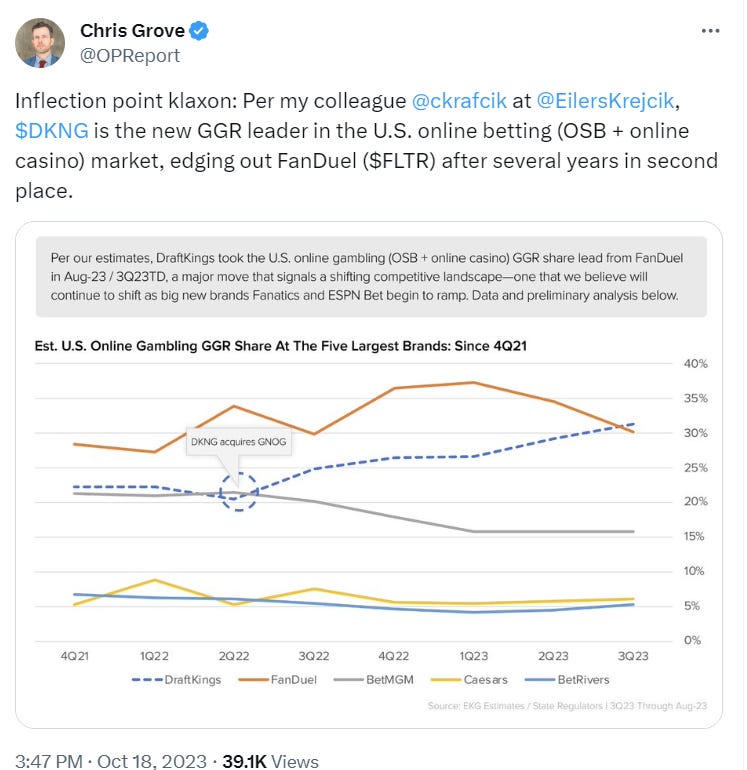Regulators Mount Up
A specific Massachusetts sports betting regulation could be a nightmare for ESPN, and any other operator with a media arm.
The Bulletin Board
NEWS: Sports betting rules in Massachusetts are creating problems for new entrants into the market.
NEWS: DraftKings surpasses FanDuel in online gambling (sports + casino) GGR.
BEYOND the HEADLINE: Can operators sustain a 12% sports betting hold percentage?
NEWS: More on the DFS 2.0 situation as the debate over Pick’ Em contests moves to North Carolina and Colorado.
QUICK HITTER: The Bellagio turns 25.
AROUND the WATERCOOLER: Success in California requires tribal support.
STRAY THOUGHTS: Bursting the bubble.
SPONSOR’S MESSAGE - Underdog: the most innovative company in sports gaming.
At Underdog we use our own tech stack to create the industry’s most popular games, designing products specifically for the American sports fan.
Join us as we build the future of sports gaming.
Visit: https://underdogfantasy.com/careers
Can ESPN Bet Navigate Massachusetts’ Rules?
As they dive headfirst into the sports betting pool, Fanatics and ESPN core businesses will likely get dragged into the conversation.
One example is the 21+ language Massachusetts requires for in-stadium signage. In Massachusetts, sports betting logos displayed at stadiums and arenas must be accompanied by 21+. The Massachusetts Gaming Commission has been steadfast, requiring the addition of 21+ to all of the company’s logos, even those not explicitly used for sports betting.
The one exception that the MGC allowed was the DraftKings Fantasy Sports Zone located on the main concourse of Gillette Stadium. DraftKings successfully argued that adding 21+ to the signage might confuse customers into believing the Fan Zone (which serves food) was a 21+ area.
Fanatics is unlikely to have any non-betting signage at stadiums, but ESPN might be required to add 21+ to its logos when it broadcasts games in the state. ESPN personalities typically sit behind a desk in the arena with the ESPN logo on the front.
Another issue ESPN might have is that we’ve seen the MGC take an interest in Barstool’s activities outside of Massachusetts. The MGC prohibited Barstool’s College Football Show from college campuses and that it was 21+ after it learned of an incident in another state. Those same restrictions would heavily impact ESPN’s College Gameday show, as the audience isn’t age-gated, and takes place on campus.
As consultant Brendan Bussmann told Sports Handle, “Precedent has been set by the commission on this, and while a majority of people are going to think it’s senseless, [ESPN and Fanatics] are going to have to find a way to jump through hoops for this and it’s going to become an issue.”
“I will hold ESPN to the same standard that I held Barstool during the application process,” MGC Commissioner Jordan Maynard said during a meeting on October 19. “ESPN has more opportunities to host sports shows than Barstool did.”
Sponsorship opportunity
Want to sponsor the fastest-growing newsletter in the gambling space? Straight to the Point has multiple sponsorship opportunities available.
Reach out to Steve at iGamingPundit.com for more details.
EKG: DraftKings Surpasses FanDuel
DraftKings is the new online gambling (sports betting and casino) leader in the US.
According to Eilers & Krejcik Gaming, DraftKings’ market share in Q3 2023 was ticked above FanDuel for the first time (see chart in tweet below).
As some have pointed out, the numbers are gross gaming revenue, which can be significantly affected by promotional dollars, not net gaming revenue. The reason GGR is used is simple: NGR data is not available in all jurisdictions.
Eilers & Krejcik Gaming’s Chris Krafcik, Alun Bowden, and Bradley Allen discussed DraftKings’ ascension to the top spot on an episode of the company’s Zero Latency podcast.
Krafcik laid out four qualities of sports betting operators:
Acquisition
Strong product
Marketing spend
Operational execution
On Point 4, Bowden noted that FanDuel was working with a proven product, while DraftKings switched from Kambi to SBTech and needed time to get the product up to speed.
Bowden called operational execution (the little things) the secret sauce of online betting. “It felt like FanDuel were playing at a different level for a while,” Bowden said. And now DraftKings has caught up.
EKG also pointed to the online casino side. As reported in Earnings+More on Monday:
“The EKG team attributed DraftKings’ success in grabbing overall market share in part to the acquisition of Golden Nugget, a solid product and, what they argued, is a significant improvement in its operational execution that allows the company to “capture more value on a per-customer basis.”
Beyond the Headline: The Rent Margin Is Too Damn High
Another area of interest that the Zero Latency podcast touched on was the margin.
They noted that both FanDuel and DraftKings believe they can hold 12% (through a combination of 4-5% hold on traditional wagers and a much higher 25% hold on parlays).
The goal of a 12% hold has some in the Eilers & Krejcik Slack chat (and elsewhere) wondering if that level of hold is sustainable. As Bowden put it, some products are above 50%, raising the legitimate question of whether or not that is 1) fun and 2) sustainable.
However, as long as the customers enjoy the product, it’s hard to bet against it, no matter what the hold rate is. For the extreme example, look at the amount of money consumers spend playing social casino apps, where the hold is 100%.
My own opinion is that a customer’s hold threshold increases with the potential payout.
Pick ‘Em Contests on Trial in North Carolina and Colorado
Here we go again.
DFS 2.0 contests are being scrutinized in two more states, North Carolina and Colorado. The number of states that have looked into Pick’ Em contests currently stands at eight.
In North Carolina, regulators are at odds with lawmakers. Regulators have included language prohibiting Pick’ Em style contests in draft sports betting rules, while the law defined DFS products.
“As author of the bill, I wasn’t trying to eliminate anybody,” North Carolina state Rep. Jason Saine, who spearheaded the state’s sports betting bill, told WRAL on Friday. “That sounds, to me, like heavy lobbying by those opposed.”
Colorado had already revised its DFS contest regulations in August. Still, it appears regulators are thinking about going a step further by prohibiting all vs. the house fantasy.
In August, Colorado regulators issued the following statement to Legal Sports Report:
“The operators have complied with what we have asked of them,” a spokesperson told LSR. “For example, operators that offer ‘pick’em’ style contests have been required to have a minimum of four athletes, and outcomes must be based on fantasy point accumulation.”
The new regulations, which were the subject of discussion on Monday, read in part:
“Fantasy contests are contests where patrons compete against other patrons. Fantasy contests where patrons compete against fantasy contest providers are prohibited.”
So, how did the hearing go? It was fairly brief and lacked a conclusion. For those interested in the highlights, Jessica Welman’s X thread is an excellent place to start.
In a separate thread, Welman asks the question many people have: why now?
“… it seems fundamentally problematic to define fantasy sports based on the definition of sports betting and then work backwards.
“In the case of Colorado, this is a state that legalized DFS years before sports betting and wrote rules based on a pre-2018 world too.
“And finally, this is a state that we all joke, given the chance, would prolly greenlight betting on Major League Rock Fighting that the sudden crackdown on this does feel a lil out of the blue.”
Quick Hitter: Happy 25th Birthday, Bellagio
I recently wrote about Rounders and online poker’s 25th anniversary, and it’s come to my attention that one of the more important poker venues has also turned 25, the Bellagio.
The Bellagio opened in 1998 and eventually supplanted the Mirage as the poker capital of the world. It officially became the new center of the poker universe following the opening of Bobby’s Room in 2004.
Cardplayer Lifestyle has a nice article on the property’s history from a poker perspective.
On the casino side, Bellagio was Steve Wynn’s second step into the experience side of gambling - Wynn’s Mirage was the first casino to produce more non-gaming revenue than gaming revenue. Wynn set his sights even higher with the Bellagio. And he delivered, ushering in the era of the destination casino that now dominates the Strip, Macau, and beyond.
Around the Watercooler
Social media conversations, rumors, and gossip.
This, from Dustin Gouker, sums up the path forward in California perfectly.
Victor Rocha was more blunt (he did have the wrong suspect, but the sentiment is correct).
Stray Thoughts
Bubbles are bad. There are far too many bubbles in the martial arts community, where an art is only pressure-tested against others within the art.
As former UFC Heavyweight Champion Josh Barnett put it, certain martial arts have been “thrown into the realm of theory to such a degree that it started operating in a vacuum. It refused to engage with the trained and the untrained.”
What Barnett is saying is that a Shotokan Karate (I’m just randomly choosing an art) organization that is in a bubble gets really good at fighting one another and modifying techniques to deal with the very specific types of attacks and defenses that are allowed in their rule set. They cease interacting with the wider world, and when someone shoots a double leg or grabs a hold of them, they’re not sure what to do.
I sometimes wonder if gambling operators, regulators, and advocates have the same issue. I’ve said this about poker in the past when I asked why we are exclusively polling current WSOP customers to see what they like and don’t like. I believe we should also be asking and placing great emphasis on the poker players and non-poker players who never or no longer participate in the WSOP and why they don’t play - I got a lot of pushback on this, by the way.
As Mason Malmuth often says, stop taking advice from professional poker players.
This can be applied to many aspects of the industry.
Are sharp sports bettors focusing exclusively on their motivations? Are responsible gambling advocates hyper-focused on developing strategies and policies that make sense and are applauded within their circle but fall flat in the real world?









